
|
When thirteen-year-old Fatima Markovic's aunt collapsed, partially paralyzed, after an apparent stroke, she and her mother put her in the makeshift wagon and set off down the road. Fatima, walking beside the wagon, holding her aunt's hand, and her mother were fleeing for their lives, seeking refuge in another land, another Four days earlier, their village of two hundred had been raided. Fatima had been doing chores in the yard when she witnessed uniformed Serbs marching into town. With terror in her eyes, Fatima ran inside her stone house screaming, "They're coming, they're coming, the Serbs are coming!" Serb soldiers, dressed in green army fatigues, barged through the front door. Carrying machineguns and flaunting 12-inch knives, they ordered the women and children to get out or die and her brother and father to freeze. Frightened, the Markovic women got out, only to be herded with the other women and children of the village into a ditch on the outskirts of town. In town center, within sight of the ditch, the men and older boys of the village were forced into a single line and filed to the side of the old mill barn. A Serb officer ordered them to hit the ground with their hands on their heads. Then, pleased with his command, the officer walked away, leaving in his wake ten armed soldiers. The officer drew a final drag from his cigarette, flicked it to the ground, and then waved over to the soldiers guarding the ditch. A soldier, receiving command, jerked his head toward the women and children and Nobody moved. The soldier directed his AK-47 at a dirt path leading away from the village. "Now!" he demanded, jabbing the assault rifle in the air. "Go, before I shoot. And don't look back!" Fatima's knees shook and her eyes flooded with tears. She'd heard about the atrocities in other villages. The Serbs had her brother and father, and she wanted to shout: Let them live! Don't take them away! Instead, "Don't shoot!" slipped from her mouth. "You," a voice shouted with authority, "shut up!" It was the soldier glaring down at Fatima with cold, Fatima's aunt yanked her by the hand and into line behind the others, who, following orders, were climbing out of the ditch. Serb soldiers escorted the women and children along the rocky path, away from village. Nobody spoke a word. It was the advent of spring, a season of rebirth and renewed life, and nobody noticed. But they did notice a cleansing, one of grave proportions. Suddenly, the rapid popping of machinegun fire sounded from the village. Fatima's heart halted. Terror set in. A small boy ahead in line began screaming for his daddy. He stepped from line and shouted back at the village with tears saturating his eyes. Bang! A shot fired, then another. The boy fell to the ground, dead, his mouth open with the cry "Daddy?" frozen in time. Now, four days after the raid, Fatima, her mother, aunt, and what remained of their village joined the mass exodus heading for the Macedonian border. Without medical help, clean water, or food, her aunt's condition worsened and she fell unconscious. But what could they do besides listen to the eerie squeaks from the wheels of the battered wagon? Under a leafless tree, Fatima spotted a motherless family of four. A teenaged girl handed the baby she was holding to a younger boy and knelt next to a prone, unshaven man, who presumably had escaped the Serbs. The girl, with tears streaming down her cheeks, kissed the man's forehead, then slowly pulled a blanket over his head. The family of three said a prayer and continued on. A half-hour later, Fatima's aunt passed on. There was no place for burial so they dragged her aunt's body off the road, picked a tree, and left the body under it. After a prayer, they continued their refuge.
Conditions were unsanitary; people were forced to urinate and defecate where they could. With the stench growing, the threat of disease was higher than ever. Occasionally food rations were handed out, but getting in line was useless, as rush and riot ensued. The few who were lucky got a small loaf of bread or a carton of souring milk. Since Fatima and her mother hadn't eaten in days and were starving, what else could they do for nourishment? Fatima left her mother and crowded in line. A carton suddenly lofted in the air for her. Unable to believe her good fortune, she reached up only to be shoved to the ground. The carton bobbled between A half-hour later, Fatima was relieved to find her mother in the spot she'd left her last. Hiding under a blanket to conceal the milk, Fatima folded back the corners of the carton and took a sip. Milk, creamy and soothing, slid down her throat and into her stomach, which, so parched, ached with pleasure. Fatima's mother sipped next. When she handed the carton back, the blanket slipped off her shoulder, revealing their pot of gold. Fatima froze. Her attention was drawn to the side, where a baby boy with dark, blinking eyes stared at her. On Fatima went over to the baby and tipped the carton to his mouth. The baby gulped, and gulped. Leaving his lips on the opening, he paused to catch his breath. Then he took more, his brown eyes brightening with swirls of hazel. A woman wrapped in blankets sat up. "Thank you!" she said weakly, "you are kind." It was the boy's mother. Fatima looked back at the boy, whose eyes, each time he blinked, sparkled with life. For that brief moment he looked like the happiest baby on earth, as if he had stumbled upon endless wealth. The two families joined into one of four. Not going anywhere, they awaited their fate. The border was closed. The road ended. There was no place to go. Thor Kirleis |
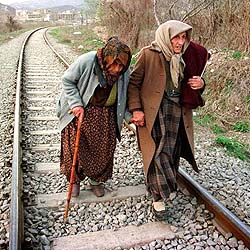 home.
home.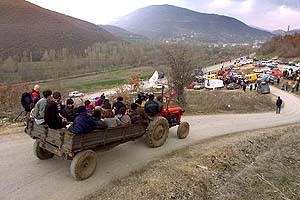 shouted, "Out, Now!"
shouted, "Out, Now!"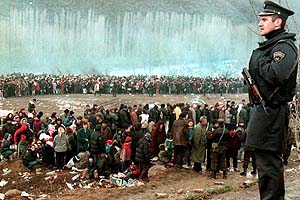 pale-green eyes.
pale-green eyes.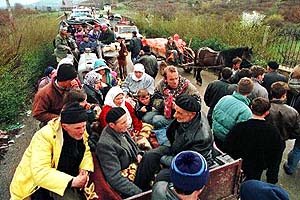
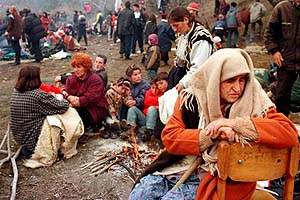 Two days later, they finally reached the Macedonian border, where they were greeted by a sea of tens of thousands of other refugees waiting to be admitted across the border.
Two days later, they finally reached the Macedonian border, where they were greeted by a sea of tens of thousands of other refugees waiting to be admitted across the border.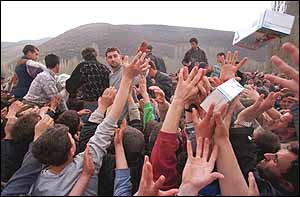 grabbing hands, then fell to the ground in Fatima's lap.
grabbing hands, then fell to the ground in Fatima's lap.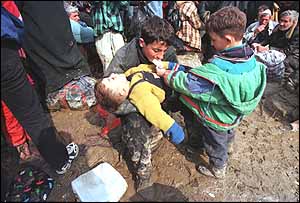 his cheeks were salty streaks from days of crying.
his cheeks were salty streaks from days of crying.